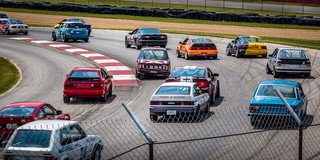
SCCA® has just taken several big steps to broaden access for drivers and race cars. As of the beginning of September, SCCA no longer requires a Novice Permit to attend a wheel-to-wheel SCCA Drivers’ School; the Club also now allows Race Experience vehicles to be issued a logbook with what amounts to a “basic safety logbook.” That means those looking to go wheel-to-wheel racing with the Sports Car Club of America can now do so with fewer barriers to entry.
The first step, which reduces the requirements for a driver to attend a Region-hosted Drivers’ School, is significant because now a driver doesn’t have to obtain their medical or apply for an SCCA Novice Permit before attending the Drivers’ School.
“It’s basically a way to allow a ‘try before you buy’ approach to race licensing,” said Jon Krolewicz, Sr. Manager of Region Track Program Development. “Until now, if you wanted to start the licensing process at an SCCA Drivers’ School, you had to be a Club member, get your SCCA medical filled out and submitted, and then purchase the Novice Permit. Now, for most drivers, all you will need is an SCCA membership and a state-issued driver’s license.
“Once you’ve satisfactorily completed the SCCA Drivers’ School, which can be recorded in the SCCA Driver Participation log or uploaded to the Member Account Portal, then you can apply for your Novice Permit to go Regional road racing,” Krolewicz added.
Those drivers who are minors will still need parental waivers, and for minor drivers without a state-issued driver’s license, they will still need to get their SCCA Novice Permit issued before attending a school.
Of course, paperwork is only one side of the equation – a race-ready competition vehicle will still be needed to enter one of the Regional Road Racing Drivers’ Schools. That’s where the second change comes to the General Competition Rules (GCR).
Now, SCCA Race Experience cars are eligible for an SCCA logbook.
“To enter a GCR-governed SCCA Road Racing event – Drivers’ School, Regional, U.S. Majors Tour®, Hoosier Racing Tire SCCA Super Tour, whatever – a race car needs an SCCA logbook,” said Krolewicz. “Before this decision, getting a logbook required a specific class, which, of course, meant meeting the rules for that class – rules that often are in place for competition balance and not pure safety.”
The SCCA Race Experience program is designed for easy access and stripped away the purely-competition requirements of section 9.3 of the GCR – things like maximum roll cage mounting area and mounting points on a roll cage, or the fuel test port.
This will allow cars from other series, which share core components of the SCCA safety requirements (cage, seat, harnesses, window net, and the like) to enter SCCA Drivers’ Schools without needing a specific SCCA class.
“Regions can now open up their Drivers’ Schools to race cars from other popular organizations, as well as write into their Regional events an allowance for those cars to run in Regional-only classes like Improved Touring X or Super Production, without needing to meet every single facet of those classes as outlined in the GCR,” said Krolewicz.
This is a new approach to who – and how – the Club invites drivers to GCR-governed events
“Maybe a driver just wants to try us out, or maybe even take advantage of excellent SCCA driving instructors before they go race with one of the popular endurance racing programs,” said Krolewicz. “This makes it easier for those folks to find a way to enjoy the SCCA without having to fully commit to classes and paperwork.”
SCCA Drivers’ School information can be found via this link.
More details regarding these changes can be found in the September 2025 Fastrack Preliminary Minutes and Tech Bulletin.
Photo by Robert Yorde










